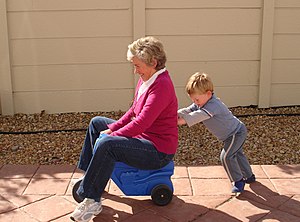In reflecting on the movie Leila, it is easy to see the conundrum couples face in traditional cultures when they can’t have or don’t want children. Many cultures just don’t accept childless unions. How many people do we know, however, who really might be having children largely for their parents, or for the tradition of having children to carry on their family gene pool, so ingrained in every society, even the most modern of ones? It’s not uncommon.
I have to admit, the continuity of family heritage, and pleasing one’s parents or in-laws with the gift of grandchildren are compelling reasons to procreate. My own parents and in-laws have been exceptionally supportive of my decision not to have children, but if I told all of them tomorrow that I had changed my mind, or that I was pregnant, would they be over-the-moon elated? You bet. Multiple year-long celebrations would be initiated. Who doesn’t like to make people you love that happy (especially because of all they did for you)? Who doesn’t like the idea of having your parents and in-laws helping to shape your child if you know they would be great at it? That part of parenting would be ideal – the part where the baby’s grandparents are cooing over the child, playing on the floor, cleaning up the mess (click here to get help for Window Cleaning in Austin TX), while you’re reading a book or having cocktails with friends. But, then the grandparents leave, and you’re stuck with all the responsibility.
Perhaps if we lived with our siblings and parents as adults, like in some traditional societies, raising a child wouldn’t be that daunting, what with all those extra hands to help out. Frankly, multiple wives made it much easier too (but don’t get too excited about that idea until you see the film Leila).
Leila grippingly explores the consequences of ignoring one’s own needs and instincts, and one’s own biological destiny to please another entity, or a culture at large. It serves as an important reminder to know ourselves and our partners and to ensure that when our partner tells us that he or she does not want a child, to believe it and to discuss that choice with frankness and honesty.
Moreover, people choosing not to have children or questioning whether it is the right choice also need to have those same frank conversations with their parents. Hopefully, if they love you enough, and if they are not as imperious and opportunistic as Reza’s mother, they will happily accept the grand dog or cat and more quality time together (because you’re not saddled with the time demands of parenting) that you offer them instead.


